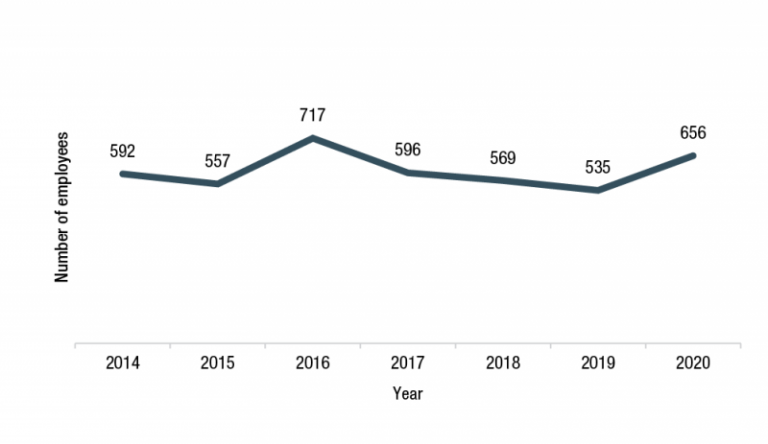Pro-integrity culture
‘Trust in the APS is related to its capacity to deliver—but the quality of both ‘what’ is delivered and ‘how’ delivery is achieved are each crucial to that trust. At each stage of their career an APS employee needs to know what professional standards and responsibilities are expected of them, needs to have developed the capabilities necessary to meet those standards and responsibilities, and needs to be held accountable for the ‘what’ and the ‘how’ of their performance, including in respect of those standards and responsibilities.’
– Steve Sedgwick AO[92]
APS employees occupy a position of trust. This brings a level of responsibility that must be matched by the highest standards of ethical behaviour. Underpinning the APS’s approach to integrity culture are the APS Values, the APS Employment Principles and the APS Code of Conduct, set out in the Public Service Act 1999. In particular, the Code of Conduct and the APS Values give ‘a clear statement to those within the APS, and to the Australian people, of the conduct that is expected of public servants’.[93]
The APS Values guide the work of every APS employee, every day. This has never been more apparent than in 2019-20. Having a shared set of values meant that, as employees surged into different APS agencies during the COVID-19 pandemic response, they understood that the expected behaviours were consistent across the service.
To maintain and foster integrity, the APS requires an institutional approach, in which the processes, governance, accountability, performance, purpose and culture of the APS are seen to be trustworthy.[94] Expanding on this concept, establishing a pro-integrity culture at the institutional level means setting a culture that values, acknowledges and champions proactively doing the right thing, rather than purely a compliance-driven approach which focuses exclusively on avoidance of wrong doing.
In a pro-integrity culture, compliance rules and penalties for breaches should not be the primary motivating factor in the day-to-day conduct of an APS employee; the motivation should be driven by a genuine commitment to upholding and championing integrity as a core component of a professional public service. Compliance measures are an important facet of an integrity framework, but work best as part of a broader pro-integrity culture. In fact, pro-integrity culture can serve as a preventative measure against misconduct; when culture, systems and processes are established on a strong foundation of integrity, misconduct or lack of integrity become more apparent, meaning employees are sensitive and alert to breaches and respond appropriately.
Trust well placed
Trust in the public sector is founded on visibility of integrity in action. APS employees who reported that their SES manager was ‘sufficiently visible’ were more likely to indicate that senior leaders in their agency promoted the APS Values.[95]
The COVID-19 crisis created a direct line of sight from the Australian community to the actions of the APS. Due to the increased need for social welfare support, many in the community have interacted or engaged with parts of the APS for the first time. This broader exposure to the work of the APS—who its people are, the services it delivers, and the systems and processes it supports—is an opportunity to increase trust in Australian public institutions.
The Citizen Experience Survey is a regular, national survey measuring citizens’ experience with services delivered by the APS. Data collected in June 2020 shows an uptick in the measures of citizen satisfaction and trust in Australian public services. In June 2020, around 3 in 4 people were satisfied or somewhat satisfied with services they'd accessed, and approximately two-thirds at least somewhat trusted services. Importantly, less than 1 in 10 people distrusted or were dissatisfied with services.[96] Results are driven by increased satisfaction in parts of the service journey including with information from the service being easy to understand and employees delivering what they say they will.
A focus on tangible outcomes for Australians is one way the APS can reinforce a culture of integrity.

Message written on footpath outside the Yarra Service Centre, Abbotsford, Victoria.
Calling it out
APS employees perceive the service to have a strong integrity culture. In the most recent APS employee census (from 2019), at least 90% of employees perceived their colleagues and supervisors ‘always’ or ‘often’ acted in accordance with the APS Values. These perceptions have remained relatively stable since questions about this were included in the APS employee census in 2014.
In a pro-integrity culture the APS is collectively accountable for ensuring it fulfils its purpose, and models behaviours such as openness, collaboration, keeping commitments, and honesty. A pro‑integrity culture is also sensitive to and intolerant of misconduct, and understands when and how to call out poor behaviour.
In the 2020 APS Agency Survey, agencies reported that 656 employees were the subject of an investigation into a suspected breach of the APS Code of Conduct that was finalised in 2019-20.
Figure 2.1: Number of APS employees investigated for a suspected breach of the APS Code of Conduct (2014 to 2020)

Source: APS Agency Survey
While the number is higher than in recent years, it remains proportionately low to the size of the workforce and demonstrates that existing reporting and investigation processes are working.
Case study: Update of social media guidance

Social media use in Australia has been steadily growing, with an estimated 18 million Australians—71% of the population—now active on social media platforms.[97] Like all citizens, APS employees hold personal views and political opinions, and participate in social media.
The trusted position the APS holds means employees expressing their views can reflect not only on them as individuals, but also on their agencies and the APS as a whole. Employees’ personal behaviour can ultimately affect the confidence of the Australian community and the Government in the integrity of the APS as an institution.
This is why some obligations as public servants extend into public servants’ private lives, and must be balanced with their rights as citizens. On social media, confidence in the APS can be undermined by individual employees’ personal behaviour.
In September 2020, the APSC released updated guidance on personal behaviour on social media. The guidance provides a practical framework to help APS employees and agencies strike a reasonable balance between employees’ right to personal and political expression and their obligations as APS employees.
The guidance contains practical examples to assist APS employees and agencies to understand and assess the risks of different online behaviours, and make sound, proportionate decisions. The updated guidance is part of the APSC’s work to enhance a pro-integrity culture within the APS.
'APS employees have a right to personal and political expression on social media. But this right must be balanced with the obligations of APS employment, and the importance of maintaining public confidence in the service.'
- Peter Woolcott AO, Australian Public Service Commissioner
[92] Steve Sedgwick AO. (2020). [unpublished]
[93] EM1 for the Public Service Bill 1999
[94] N. Kirby & S. Webbe, Being a trusted and respected partner: the APS Integrity Framework, ANZSOG, 2019.
[95] 2019 APS employee census
[96] Early results from the forthcoming Department of the Prime Minister and Cabinet Citizen Experience Survey, 2020.
[97] We Are Social. (2020). Digital 2020 Australia



